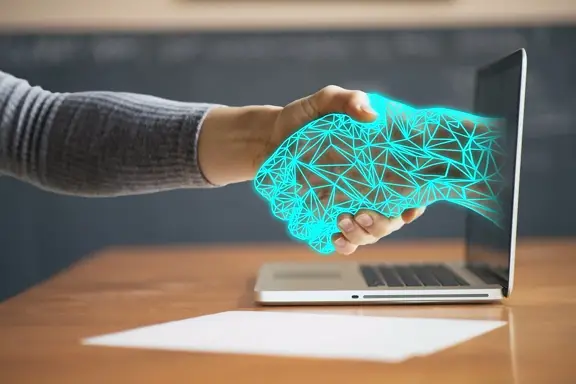How AI and Machine Learning Can Tackle Key Recruiting Problems
Recruiters and talent professionals understand the advantages of embracing innovation, but they are also aware of the risks associated with cutting-edge technology. For instance, artificial intelligence and machine learning can streamline recruiting tasks, yet they carry the potential for bias and influence hiring choices.
In this blog, Aniday will delve into how AI and machine learning can tackle key recruiting problems, discuss their pros and cons, and explore methods to mitigate bias. Additionally, we'll examine how Aniday utilizes AI and ML to enhance the candidate experience.

Addressing Recruitment Challenges with AI and ML
Aniday highlights four critical areas where AI and ML can be instrumental in addressing key hiring challenges. The panel explores how artificial intelligence and machine learning can empower talent professionals to overcome these issues.
1. Efficient Candidate Sourcing
-
Are there more effective methods and sources for finding top talent?
-
Sub-categories include diversifying sourcing, achieving pipeline parity, and optimizing candidate storage practices.
2. Optimizing the Hiring Process
-
How can we assess our hiring performance and continuously improve?
-
How can machines assist in enhancing the hiring experience?
-
Sub-categories encompass benchmarking data, actionable insights, setting meaningful metrics, and personal growth within roles.
3. Effective Hiring at Scale
-
What does successful large-scale hiring entail?
-
How can talent retention and team productivity be measured and improved?
-
Sub-categories involve high-volume hiring, talent acquisition, intelligent interviewing, and enhancing team productivity.
4. DE&I Enablement
-
How can collected data be transformed into valuable insights for better outcomes in diversity, equity, and inclusion (DE&I)?
-
Sub-categories include DE&I in hiring, retention, sourcing, and candidate experience.
The Benefits and Risks of Applying Machine Learning in Recruiting

1. Benefits
-
Efficiency: AI and ML can significantly reduce the time and effort required for repetitive tasks like resume screening, interview scheduling, and reference checks.
-
Consistency: AI ensures a consistent approach to assessing candidates, eliminating subjective biases in the process.
-
Cost Savings: Automating various aspects of the recruitment process can lead to significant cost reductions.
-
Improved Quality of Hire: Machine learning can predict which candidates are more likely to excel in a specific role, ultimately leading to better hiring decisions.
-
Enhanced Candidate Experience: AI-powered chatbots and virtual assistants offer candidates 24/7 support, creating a positive impression of the organization.
2. Risks
-
Bias and Fairness: AI algorithms can inherit biases present in historical data. Ensuring fairness in AI-driven recruitment processes requires careful data curation and model evaluation.
-
Privacy Concerns: Gathering and analyzing candidate data may raise privacy concerns. Transparency and data protection are essential.
-
Technical Challenges: Developing and implementing AI systems can be complex and may require specialized technical expertise.
-
Human Touch: While automation is beneficial, a human touch is still necessary for critical decision-making and personal interactions with candidates.
Mitigating Bias in the Recruitment Process Using AI and Machine Learning
Reducing bias in the recruitment process is crucial for fostering diversity and inclusivity in the workplace. Here are several ways AI and ML can help:
1. Job Description Analysis
AI can analyze job descriptions to identify and remove biased language and requirements, ensuring they are inclusive and encourage a diverse candidate pool.
2. Resume Screening
AI algorithms can focus solely on qualifications and skills, ignoring personal information, reducing the likelihood of unconscious bias in candidate selection.
3. Interview Scheduling
Automated scheduling tools can prioritize interview times without bias, ensuring all candidates have equal opportunities.
4. Interview Assessment
AI can evaluate video interviews to assess candidates based on objective criteria, such as their responses and skills, rather than subjective judgments.
5. Candidate Engagement
AI-driven chatbots can provide standardized responses to candidates, ensuring that every interaction is consistent and bias-free.
6. Data Analysis
Regularly review data and algorithms for bias. Take steps to rectify any biases identified during the process.
7. Here’s What Else to Consider
Ensure that your AI and ML systems are built with diversity and fairness in mind. Diverse training data, bias mitigation techniques, and third-party audits can help in this regard.
Aniday's Approach on Using AI and ML to Improve the Candidate Experience

Aniday, a leading recruitment software company, has embraced AI and ML to enhance the candidate experience. Here's how they have leveraged these technologies:
-
Streamlined Resume Screening: Aniday's AI-driven system quickly scans resumes, identifies the most suitable candidates, and ensures that no qualified applicant is overlooked.
-
AI-Powered Chatbot: Their chatbot provides candidates with instant responses to common queries, such as application status, interview schedules, and company information, making the recruitment process more user-friendly.
-
Diversity and Inclusion: Aniday has implemented a rigorous diversity and inclusion strategy. They use AI to ensure job descriptions and candidate evaluations are free from bias, encouraging a broader range of applicants.
-
Continuous Improvement: The company uses AI-driven analytics to assess the effectiveness of their recruitment process continually. Insights gathered are used to refine their strategies.
-
Predictive Analytics: Aniday uses machine learning algorithms to predict the likelihood of a candidate's success in a given role, which has led to more informed hiring decisions.
For the blog post, Aniday has explored "How AI and machine learning can tackle key recruiting problems”. AI and ML have the potential to address various recruitment challenges by improving efficiency, reducing bias, and enhancing the overall candidate experience. However, it's crucial to use these technologies responsibly, with a focus on fairness, transparency, and ongoing human involvement. As organizations embrace AI and ML in their hiring processes, they can unlock new possibilities and stay competitive in the ever-evolving world of talent acquisition.
Aniday's HR Services
Headhunting Service
Find and recruit quality candidates in just 1 week! Supported by 40,000 experienced headhunters in IT, Finance, Marketing… capable of recruiting in any region.
Headhunting Service ➔Employer of Record (EOR) Service
On behalf of your business, we recruit employees and handle payroll without the need to establish a company in markets such as Vietnam, Singapore, Malaysia, India, Indonesia…
Employer of Record (EOR) Service ➔